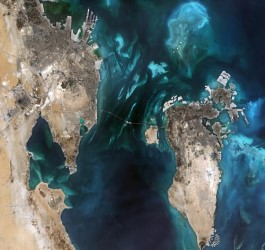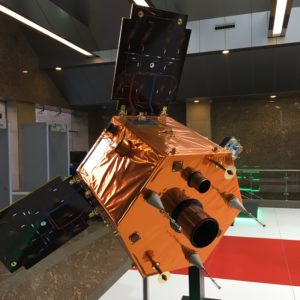
Throughout the Middle East, one of the most geopolitically consequential regions in the world, countries are using space for a range of civil, commercial, and security purposes. It is a region where space is contested, a means to prestige, and the subject of political and economic development and controversy.
For decades, Israel was the only country in the region with a space programme, and to this day it is the regional leader in satellite technology, industrial and scientific capacity, and military and civil space applications. Over the past decade, though, it has become arguably easier to name the countries in the region that do not operate a satellite or have established a space agency.
Despite Israel’s lead in space, however, it is Iran that is at the center of multiple and overlapping geopolitical competitions across the region. Gulf Cooperation Council (GCC) states such as Saudi Arabia and the United Arab Emirates may see Israel’s space programme as the standard to achieve (though you will not hear officials from these programmes admit as much in public), but it is Iran that is spurring their programmes. Both the UAE and Saudi Arabia have recently ordered (or are on the verge of ordering) sophisticated, high-resolution reconnaissance satellites. Both countries are also setting up their own satellite manufacturing capabilities, and the UAE has set itself the challenge of placing its Hope probe in Mars orbit in 2021, marking the 50th anniversary of the UAE’s founding.
While there are significant disparities between all regional competitors in terms of space budgets, technology, and scientific and engineering capacities, most Middle Eastern space activities take place with at least one eye on competitors. Some of these rivalries are potentially more dangerous than others, such as those between GCC states and Iran and Israel and Iran. Just as interesting, however, is the friendly rivalry between the Saudi Arabia, UAE, and to a lesser extent, Qatar, in achieving regional space firsts, commercial competition, and space investments.
Across the Arabian Gulf, Iran’s space programme has operated under a tough sanctions regime and relative international isolation. Yet despite these severe constraints and a far less advanced technological base, the Iranian space programme has persisted and is, for the most part, self-reliant. Where Iran finds itself behind its Israeli and Arab rivals in terms of budget and technology, it is a leader in scientific and engineering skills and education. Israel and Gulf Arab countries fear that the confluence of sanctions relief and economic reform could unleash Iran’s potential as a regional military and space power, placing them at a possible disadvantage. Until then, Iran must rely on indigenously built but technologically inferior satellites, as well as systems built by its Russian ally (who are thought to be building a high-resolution imaging satellite for Tehran), for its space needs. Iran is also the only country in the Middle East other than Israel capable of launching its own satellites into orbit, though it can only launch Nanosatellite-sized payloads and so must rely on Russia for the launch of all its other satellites.

Commercially, the Greater Middle East’s vast geography, crowded satellite television news sector, and varied economic and technological development provides a highly competitive yet constantly evolving market for commercial satellite communications providers such as Arabsat, Yahsat, Es’hailSat, Nilesat, Turksat, and Israel’s Spacecom. The intense geopolitical competition between Iran and the rest of the region means that satellite broadcasts are often jammed by the authorities in Tehran who deem them to be part of a deliberate ‘Soft War’ conducted by Western powers along with the Israelis and Gulf Arab states to undermine their political, religious, and cultural authority.
The Middle East’s oil and gas sector, as well as its tumultuous geopolitics and security conditions, also means that it is a major market for commercial satellite imagery companies such as DigitalGlobe and Airbus, although remarkably there is only one regionally-based satellite imagery provider, Israel’s ImageSat International. However, one commercial area where the Middle East is deficient (with the notable exception of Israel) is in space technology and services start-ups. This is mostly due to the sclerotic economic culture of most Arab states, characterized by endemic corruption, complex and bloated bureaucracies, and contradictory regulatory environments throughout much of the region.
Despite the urgent need for economic reform in many Arab states, space programmes are seen by many Middle Eastern governments as highly visible means for economic modernization, development, and prestige. Paradoxically, however, the regional emphasis on large government programmes and state-backed or subsidized satellite corporations is increasingly at odds with the shift toward private enterprise and public-private partnerships for satellite applications, services, and even space exploration seen in many Western countries.
Often, space programmes in the Middle East can be a hard sell when political and economic conditions leave a lot to be desired. In Egypt, for example, the government of President Sisi recently announced the establishment of a space agency in order to coordinate that country’s myriad space activities. With endemic political instability, corruption, and atrocious economic conditions for most Egyptians, the nature and timing of Cairo’s space agency announcement could not have been worse, or more politically tone deaf.

In Turkey, the politics of space takes on a different character. The attempted coup against the government of President Erdogan on July 15, 2016, and its subsequent political and military purges has further delayed the creation of the long-awaited Turkish Space Agency. Among Turkish government entities involved in national space programmes, the Turkish Air Force is probably the most prominent yet has been disproportionately affected by the government purges of alleged coup plotters. This has resulted in the removal of large swaths of space policy and engineering expertise from the Turkish government.
This is merely a snapshot of space activities throughout the Greater Middle East, with developments and changes occurring on a weekly basis and which reflect the complex and often tragic politics of the region. Policy makers, analysts, executives, and investors looking to understand the future of global space trends and developments would do well to follow Middle Eastern space activities. If you can understand the ambitions, achievements, challenges, and disappointments of Middle Eastern space activities, and all of their regional and global interconnections and significance, then you will also understand 21st century space policy on a global scale.
Dr. John B. Sheldon, is the Co-founder of SpaceWatch Middle East, and is based in Abu Dhabi, UAE.
A version of this essay was published in the March 13, 2017, issue of Space News, and is republished with permission of Space News at: https://spacewatch.global/2017/04/spacewatchme-oped-the-middle-east-a-microcosm-of-our-new-space-age/
 SpaceWatch.Global An independent perspective on space
SpaceWatch.Global An independent perspective on space

